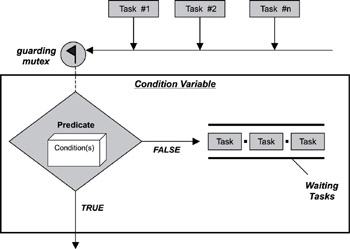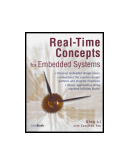Книга: Real-Time Concepts for Embedded Systems
8.5 Condition Variables
Tasks often use shared resources, such as files and communication channels. When a task needs to use such a resource, it might need to wait for the resource to be in a particular state. The way the resource reaches that state can be through the action of another task. In such a scenario, a task needs some way to determine the condition of the resource. One way for tasks to communicate and determine the condition of a shared resource is through a condition variable. A condition variable is a kernel object that is associated with a shared resource, which allows one task to wait for other task(s) to create a desired condition in the shared resource. A condition variable can be associated with multiple conditions.
As shown in Figure 8.13, a condition variable implements a predicate. The predicate is a set of logical expressions concerning the conditions of the shared resource. The predicate evaluates to either true or false. A task evaluates the predicate. If the evaluation is true, the task assumes that the conditions are satisfied, and it continues execution. Otherwise, the task must wait for other tasks to create the desired conditions.

Figure 8.13: Condition variable.
When a task examines a condition variable, the task must have exclusive access to that condition variable. Without exclusive access, another task could alter the condition variable's conditions at the same time, which could cause the first task to get an erroneous indication of the variable's state. Therefore, a mutex is always used in conjunction with a condition variable. The mutex ensures that one task has exclusive access to the condition variable until that task is finished with it. For example, if a task acquires the mutex to examine the condition variable, no other task can simultaneously modify the condition variable of the shared resource.
A task must first acquire the mutex before evaluating the predicate. This task must subsequently release the mutex and then, if the predicate evaluates to false, wait for the creation of the desired conditions. Using the condition variable, the kernel guarantees that the task can release the mutex and then block-wait for the condition in one atomic operation, which is the essence of the condition variable. An atomic operation is an operation that cannot be interrupted.
Remember, however, that condition variables are not mechanisms for synchronizing access to a shared resource. Rather, most developers use them to allow tasks waiting on a shared resource to reach a desired value or state.
- 8.5.2 Typical Condition Variable Operations
- 3.3.2 Waiting on a condition variable
- Unconditional Execution
- 8.5.3 Typical Uses of Condition Variables
- 15.7.4 Using Condition Variables to Synchronize between Readers and Writers
- 15.7.6 Implementing Reader-Writer Locks Using Condition Variables
- 3.3 Condition variables
- 8.1.5 Never share condition variables between predicates
- 9.3.5 Condition variables
- RSS Readers
- The Parts of a LOOP
- CHAPTER 25 Using Perl




